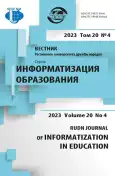Digitalization of motivational features as a way to organize independent work of bachelors
- 作者: Dobrovolskaia N.Y.1
-
隶属关系:
- Kuban State University
- 期: 卷 20, 编号 4 (2023)
- 页面: 386-395
- 栏目: EVOLUTION OF TEACHING AND LEARNING THROUGH TECHNOLOGY
- URL: https://journal-vniispk.ru/2312-8631/article/view/321272
- DOI: https://doi.org/10.22363/2312-8631-2023-20-4-386-395
- EDN: https://elibrary.ru/CKFVUF
- ID: 321272
如何引用文章
全文:
详细
Problem statement . Effective organization of extracurricular work for future bachelors involves the construction of individual learning trajectories, based, among other things, on the level of motivation to study specialized disciplines. The expediency of using intelligent information technologies in classifying the composition and forms of independent work of bachelors of applied mathematics is substantiated. Methodology. Applying the developed mobile application, multi-parameter motivational characteristics of students were identified. The resulting motivational profiles are clustered into five motivational groups, similar in sign values. The construction and analysis of multi-parameter classification were carried out via cluster analysis and neural network technologies. Clustering of motivational groups and the application of appropriate strategies for organizing independent work were realized at the Faculty of Computer Technologies and Applied Mathematics of Kuban State University. Results. The constructed neural network classifies the bachelor's motivational profile, assigns him a strategy for independent work, defining the specific values of the variable elements of the strategy. Strategies for organizing independent work have been established for clustered motivational groups. Conclusion. Construction and clustering of motivational profiles allows you to adjust individual strategies for independent learning of bachelors of applied mathematics, determine the values of variable elements and, as a result, not only develop professional skills, but also develop skills in organizing your own work process, resource allocation, and identifying work stages.
作者简介
Natalia Dobrovolskaia
Kuban State University
编辑信件的主要联系方式.
Email: dnu10@mail.ru
ORCID iD: 0000-0002-8480-1643
PhD of Pedagogical Sciences, Docent, Associate Professor of the Department of Information Technology, Faculty of Computer Technologies and Applied Mathematics
149 Stavropolskaya St, Krasnodar, 350040, Russian Federation参考
- Beshenkov SA, Shutikova MI, Nikiforova TI. Digital educational environment: usage strategy and development factors. Pedagogical Informatics. 2021;(1):105–112. (In Russ.)
- Boronenko TA, Kaisina AS, Fedotova VA. Organizing educational institutions networking cooperation through distance learning technologies within regional education system. Turkish Online Journal of Distance Education. 2018;19(2):86–100. http://doi.org/10.17718/tojde.415681
- Boronenko TA, Kaisina AS, Fedotova VA. Development of digital literacy of schoolchildren in the context of creating a digital educational environment. Prospects for Science and Education. 2019;(2):167–193. (In Russ.) http://doi.org/10.32744/pse.2019.2.14
- Boronenko TA, Kaisina AS, Fedotova VA. Conceptual model of the concept of digital literacy. Prospects for Science and Education. 2020;(4):47–73. (In Russ.) http://doi.org/10.32744/pse.2020.4.4.
- Ibragimov HI. Organization of independent work of students in the context of digitalization of university education. Science and Education Today. 2020;(7):74–75. (In Russ.)
- Robert IV. Didactic-technological paradigms in informatization of education. SHS Web of Conferences. 2018;47:01056-62. https://doi.org/10.1051/shsconf/20185503014
- Sedakova VI. Independent work of students as an individual trajectory of development. Herald of South-Ural State Humanities-Pedagogical University. 2013;(5):108–116. (In Russ.)
- Arkhipova AI, Grushevsky SP, Pichkurenko EA., Sevryugina NI, Shmalko SP. Hermeneutical approach to the design process interactive learning environment technologies. CEUR Workshop Proceedings. Yalta; 2021. p. 25–37.
- Robert IV. Formation and development of digital transformation of domestic education on the basis of systemic convergence of pedagogical science and technology. E3S Web of Conferences. 2021;101:03017. https://doi.org/10.1051/shsconf/202110103017
- Bubenshchikova IA, Litvinova MV, Kolomina MV, Vezirov TG. Use of project technologies in implementation of activity approach in training first-year bachelorś degree students at modern stage of education digitalization. CEUR Workshop Proceedings: SLET 2019 – Proceedings of the International Scientific Conference Innovative Approaches to the Application of Digital Technologies in Education and Research, Stavropol – Dombay, 20–23 May 2019. Stavropol – Dombay: CEUR-WS; 2019.
- Shirinkina EV, Sobirov BSh. Digital transformation of Russian universities: analysis of best practices. Scientific Research and Development. Economy. 2021:9(2):51–55. (In Russ.) http://doi.org/10.12737/2587-9111-2021-9-2-51-55
- Chapaev NM. The possibilities of artificial intelligence in the educational and educational spheres. Economics and Entrepreneurship. 2021;(10):1261–1264. (In Russ.) http://doi.org/10.34925/EIP.2021.135.10.243
- Kraft NN. Independent work as a means of self-development of students. Bulletin of Adyghe State University. 2006;(4):124–125. (In Russ.)
- Litvinov VA. On increasing the motivation for learning computer science. Bulletin of Ufa Law Institute of the Ministry of Internal Affairs of Russia. 2020;(2):179–184. (In Russ.)
- Tutova OV. Methodical methods for the formation of educational motivation of students in the classroom in informatics in a higher educational institution. Problems of Modern Pedagogical Education. 2019;64–2:184–189. (In Russ.)
补充文件









